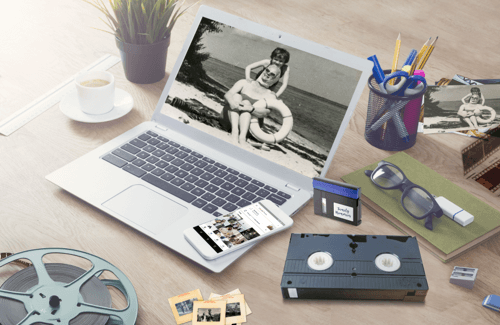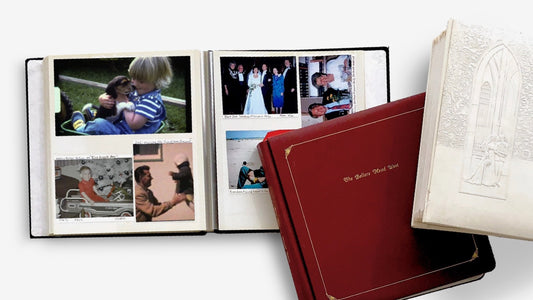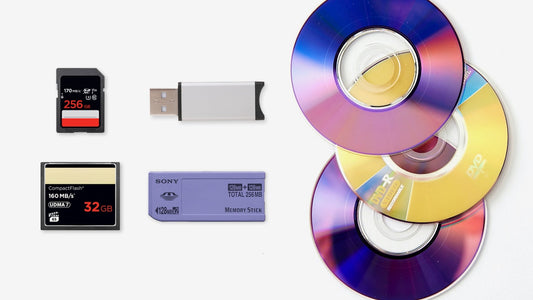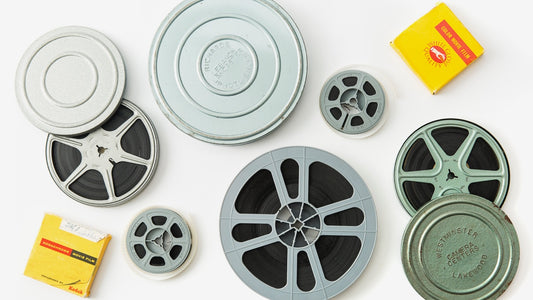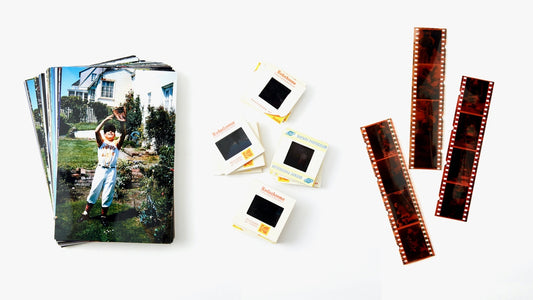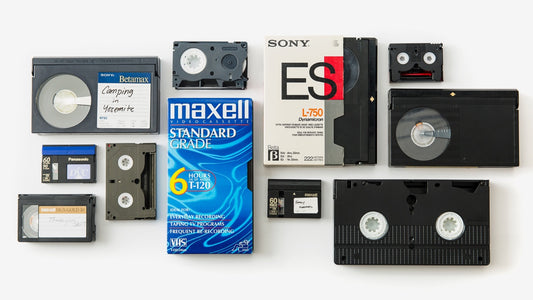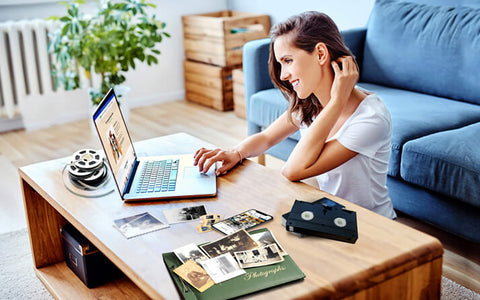Your kids and grandkids have probably never seen a VCR, let alone used one. This means an entire generation of your family’s history—from your wedding day to their parents’ first steps—is locked away on unplayable VHS tapes. You want to share these moments, but how? Many people start by looking for “vhs to dvd near me,” thinking a local shop is the answer. While convenient, it’s just one of several paths you can take. To truly bring these memories back to life for everyone to enjoy, you need a solution that offers quality, security, and modern sharing options. Let’s explore the best ways to convert your tapes so your family’s stories can be passed down and celebrated for years to come.
Key Takeaways
- Know Your Conversion Options: You can choose between specialized mail-in services for the highest quality and security, or convenient drop-off locations like Walmart or CVS. Your best choice depends on whether you prioritize expert handling or local accessibility.
- Look Beyond the Price Tag: A trustworthy service offers more than a low cost. Prioritize companies with transparent, per-tape pricing, a secure US-based process, and modern digital formats (like MP4s) that make your memories easy to save and share.
- Prepare Your Tapes for Success: A great digital transfer starts with a little prep work from you. Taking a few minutes to organize, label, and inspect your tapes for damage helps ensure the professionals can deliver the best possible result for your family’s history.
Where to Convert VHS Tapes to DVD
When you’re ready to bring your old home movies into the digital age, you have several great options. The right choice for you really depends on your budget, how many tapes you have, and how hands-on you want to be. Let’s walk through the most common places to get your VHS tapes converted.
Find a Professional Digitization Service
If you want to ensure your precious memories are handled with care by people who do this every day, a professional service is the way to go. Companies like YesVideo specialize in this work, so you can feel confident your tapes are in good hands. You simply mail in your collection, and trained technicians use high-quality equipment to manage the entire video transfer process. This is the perfect option if you’re looking for top-notch quality and peace of mind without having to figure out any of the technical details yourself.
Check National Retail Chains
You might be surprised to learn that many big-box stores you visit regularly offer media conversion. Retailers like Walmart and Walgreens have photo centers that can digitize your old home movies. This can be a really convenient choice, as you can just drop off your tapes while you’re out running errands. It’s a straightforward way to get your project started without having to ship your tapes anywhere. Just be sure to ask about their process and turnaround times, as they often send the tapes out to a third-party processor.
Visit Local Electronics Stores
Some local stores and pharmacies also provide VHS to DVD conversion. For instance, many CVS Photo locations have services that can help you digitize your tapes. This is another convenient, local option that’s worth looking into. It’s a good idea to call your nearest store ahead of time to confirm they offer the service and to get details on their pricing and timeline. This can be a great middle-ground if you want to drop your tapes off in person but prefer a smaller store environment.
Ask Your Local Library or Community Center
For a more community-focused or potential DIY approach, don’t forget about your local library. Some library systems have media labs or "maker spaces" with equipment you can use to convert your own tapes for free or for a small fee. While this requires you to do the work yourself, it can be a very budget-friendly solution. Even if they don’t have the equipment, librarians are fantastic resources and might be able to point you toward other local, affordable options for preserving your family’s memories.
What to Look For in a VHS to DVD Service
Choosing a service to handle your family’s memories is a big decision. After all, those tapes hold irreplaceable moments from birthday parties, weddings, and quiet family afternoons, and you want them treated with the utmost care. Not all conversion services are created equal, so it’s worth taking a moment to understand what separates a great service from a risky one. The right choice ensures your videos are preserved beautifully for generations, while the wrong one could result in poor quality or, even worse, lost memories. A little research upfront can make all the difference in the quality of the final product and your peace of mind.
When you’re comparing options, think beyond just the price tag. You’re looking for a partner who values your memories as much as you do. This means finding a company that uses professional equipment, has a secure process for handling your tapes, and is transparent about its services and costs. From the moment you pack your tapes into a box to the day you sit down to watch your newly digitized videos with your family, you should feel confident and informed. It’s about trusting that your history is in good hands. Let’s walk through the key things to look for to ensure you find a service that will protect and preserve your cherished moments.
High-Quality Equipment and Standards
The quality of your digital videos depends heavily on the equipment used for the transfer. Professional services use broadcast-quality decks and specialized conversion hardware that you just can’t find in a consumer-grade VCR. This equipment can often correct tracking issues and stabilize the picture for a clearer final result. Beyond the gear, look for a service with experienced technicians. They bring a wealth of knowledge to the table, ensuring your tapes are handled with precision and care, especially if they’re old or fragile. This expertise is crucial for getting the best possible transfer from decades-old media.
How They Keep Your Memories Safe
Handing over your only copy of a precious memory can be nerve-wracking. A trustworthy service will have a robust system to keep your tapes safe from the moment they leave your hands. Look for a company that does all its work in-house in the USA, rather than shipping them overseas. The best services provide a crush-proof shipping box and track your order every step of the way with barcodes and status updates. This professional approach to video transfer offers a level of quality assurance and security that’s difficult to achieve with DIY methods or smaller, less-established operations.
Your Digital Format Options
While you might be thinking about DVDs, it’s smart to consider more modern digital options, too. Most top-tier services offer digital files (like MP4s) on a thumb drive or via a cloud service. Digital files are incredibly versatile—you can easily save them to your computer, share them on social media, or edit them into new home movies. Some services, like YesVideo, provide a private online account where you can view, download, and share your digitized memories. This is especially helpful if you have other media, like film reels or photo albums, that you want to digitize as well.
Helpful Customer Support
When you have questions about your precious memories, you want to be able to talk to a real person. Before committing to a service, check out their customer support options. Do they have a phone number, email, or live chat available? A company that is easy to reach is more likely to be helpful if you have questions or concerns during the process. Good customer support is a sign that the company stands behind its work and cares about your experience, offering you peace of mind from start to finish.
Clear Turnaround and Shipping Times
Digitizing tapes properly takes time, so be wary of any service promising an instant turnaround. A reputable company will give you a clear and realistic estimate of how long the process will take. They should also have a well-defined shipping process. Look for services that provide a sturdy, pre-paid shipping box to send your tapes in and that guarantee the safe return of your original media along with your new digital copies. Knowing the timeline and how your tapes will be handled during transit helps manage expectations and reduces worry.
Transparent, Upfront Pricing
No one likes surprise fees. A trustworthy service will have clear, upfront pricing on its website so you know exactly what you’re paying for. Check to see if the price is per tape, per hour of footage, or based on another model. The cost should ideally include the digitization itself, your choice of DVD or digital format, and the safe return of your original tapes. Be cautious of prices that seem too good to be true, as they may come with hidden charges for things like tape repair, mold cleaning, or even just getting your originals back.
How Much Does VHS to DVD Conversion Cost?
Figuring out the cost of converting your home movies doesn't have to be confusing. While prices vary between services, most companies base their fees on the number of tapes you have. Let's break down the typical costs so you know what to expect and can find a service that fits your budget.
Basic Service Costs
The most common pricing model you'll find is a flat fee per tape. Generally, you can expect to pay between $15 and $25 for a standard video transfer. This basic fee usually covers the professional digitization of one VHS tape to a shareable digital format. It’s a straightforward approach that makes it easy to estimate your total cost based on the size of your collection, whether you have a handful of tapes or a few dozen.
Additional Features and Fees
Beyond the basic conversion, many services offer add-ons that can affect the final price. If you want extra copies of a DVD to share with family members, there's often an additional fee per copy. You might also see options for personalized DVD cases or getting your digital files delivered on a USB drive, which can add to the total. It’s always a good idea to check what’s included in the base price and what’s considered an extra.
Discounts for Bulk Orders
If you have a box full of tapes waiting to be digitized, you're in luck. Many companies provide discounts for larger orders, which can significantly lower the per-tape cost. Some services offer pre-paid kits where you can send in a specific number of tapes for a set price. This is a great option for families looking to preserve an entire collection of memories at once while getting the best value for their investment.
Different Package Options
When you convert your tapes, you’ll often have a choice in how you receive your new digital memories. While DVDs are a classic option, many people now prefer the flexibility of digital files. Most professional services let you choose between DVDs, a USB thumb drive, or a digital download link. Opting for a digital media transfer gives you the freedom to easily save, share, and watch your home movies on computers, smart TVs, and phones.
Common Hidden Charges to Avoid
To avoid surprises on your final bill, it’s important to watch out for hidden fees. Some services have charges that aren't immediately obvious. For example, a company might charge by the hour instead of by the tape, which can get expensive if your tapes are long. Also, be sure to ask if there are fees for blank tapes or if there's a limit to how much video fits on a single DVD, as this can also impact your total cost. A transparent service will be upfront about all potential charges.
How to Prepare Your VHS Tapes for Conversion
Getting ready to digitize your home movies is an exciting step toward preserving your family’s history. Before you pack up that box of tapes, taking a little time to prepare them can make a huge difference in the quality of your final digital copies. Think of it as setting your memories up for success. A few simple checks and organizational steps will streamline the process and ensure your precious moments are handled with care.
This preparation isn't just about logistics; it's an act of care for the memories themselves. When you send your tapes to a professional service, you're handing over irreplaceable moments—birthdays, holidays, weddings, and everyday laughter. By assessing and organizing them beforehand, you help the technicians understand what they're working with, which can lead to a better-quality transfer. A well-prepared collection allows the experts to focus on what they do best: carefully converting your analog memories into lasting digital formats. Following these tips will help protect your tapes and make the journey from a dusty box to a digital library a smooth one, ensuring your family's stories can be shared for generations to come.
Assess Your Tapes' Condition
First, give your tapes a quick inspection. You don’t need to be an expert, just look for obvious signs of trouble. Check the plastic casing for any cracks or damage that could cause problems during playback. Look through the small, clear window to see the tape itself. Does it look smooth, or is it wrinkled, crinkled, or tangled? Also, keep an eye out for white or fuzzy spots on the tape ribbon, which could be a sign of mold. If you find a moldy tape, it's best to separate it from the others to prevent it from spreading. Identifying any common problems with VHS tapes ahead of time helps set realistic expectations and lets you flag any tapes that might need special attention from the professionals.
Store Your Tapes Properly
How you store your tapes, both before and after you’ve gathered them for conversion, really matters. VHS tapes are sensitive to their environment, and years of improper storage can take a toll. To prevent further degradation, keep them in a cool, dry place away from direct sunlight and heat sources like vents or attics. Extreme temperatures and humidity are the enemy, as they can cause the magnetic tape to become brittle or sticky. The best way to store them is upright in their original sleeves or cases, which helps protect them from dust and pressure. Proper VHS tape storage is one of the easiest ways to maintain their quality until they’re ready for their digital debut.
Organize Your Collection
A little organization goes a long way in making the digitization process feel manageable. Before sending your tapes off, take a moment to label them clearly. If the original labels are gone or faded, use a sticky note or a piece of masking tape to write down what you think is on them—like "Family Vacation 1995" or "Sarah's 5th Birthday." It’s also helpful to number the tapes in the order you’d like them to be processed. This not only helps you keep track of your collection but also makes it much easier to sort through your digital files later. Creating a simple list of your tapes to include in the box can give you peace of mind that everything is accounted for during the VHS conversion process.
Test and Clean Your Tapes
If you still have a working VCR, it’s a good idea to fast-forward and then fully rewind each tape. This helps ensure the tape is properly tensioned on the spools, which can prevent playback issues during the transfer. As for cleaning, you can gently wipe down the outside of the plastic cassette with a soft, dry cloth to remove any dust. However, you should avoid trying to clean the magnetic tape ribbon yourself. It’s incredibly delicate and can be easily damaged by household cleaners or improper handling. Professional services have specialized equipment to safely clean and play your tapes, so it’s best to leave the deep cleaning to them to avoid any accidental damage to your memories.
Note Any Special Handling Needs
Do you have a tape that’s especially important or one you know is damaged? Maybe the tape snapped years ago, or the plastic casing is broken. Make a note of any tapes that require special handling and be sure to communicate this when you place your order. Pointing out these issues ensures your most vulnerable memories are treated with the utmost care and precision. Professional services are equipped to handle many common repairs and will take extra precautions with fragile tapes. When you send your memories to YesVideo, you can trust that our team of experts will handle them carefully every step of the way, giving each tape the individual attention it deserves.
Should You Go Pro or DIY?
Deciding whether to convert your VHS tapes yourself or hand them over to a professional is a big question. On one hand, the DIY route can feel empowering. On the other, these are your family’s irreplaceable memories, and you want them handled with care. There’s no single right answer, but weighing the key factors—equipment, time, quality, cost, and risk—will help you make the best choice for your precious home movies.
Let's break down what each path really involves so you can decide with confidence.
The Equipment You'll Need
If you decide to tackle this project yourself, you’ll need a few key pieces of gear. First and foremost is a working VCR, which can be surprisingly hard to find. Since they aren't made anymore, you'll be looking at used models that can cost anywhere from $250 to over $600, with no guarantee of their condition. You’ll also need a VHS-to-digital converter and a computer with enough storage to hold the large video files.
A professional service already has all the high-end, specialized equipment needed for a perfect video transfer. They can handle various formats beyond standard VHS, like VHS-C, S-VHS, and MiniDV, ensuring every memory is preserved.
How Much Time It Takes
DIY video conversion is a real-time job. That means a two-hour tape will take at least two hours to capture on your computer—and that doesn't include setup, troubleshooting, or editing. If you have a box full of tapes, you’re looking at a significant time commitment. You’ll need to monitor the process for each tape to make sure there are no glitches or chewed-up tapes.
Going with a professional service is much simpler. You gather your tapes, send them in, and wait for your digital files to arrive. It frees you up from spending weekends tethered to a VCR and lets the experts handle the time-consuming work for you.
The Difference in Quality
While a DIY conversion can get the job done, the quality of the final product often depends on the condition of your VCR and the converter you use. The result can be inconsistent, with potential issues like tracking errors or color distortion.
Professional services bring years of experience to the table. Their technicians know how to get the best possible picture and sound from old tapes, often correcting minor imperfections along the way. They use commercial-grade equipment that’s far more advanced than consumer-level gear, resulting in a cleaner, more stable digital copy of your memories.
A Look at the Costs
At first glance, DIY might seem cheaper, but the costs can add up quickly. After buying a reliable VCR and a quality converter, you could easily spend several hundred dollars before you even convert a single tape. This route might make financial sense if you have a massive library of tapes, but for most people, the upfront investment is steep.
Professional conversion services typically charge on a per-tape basis, often between $9 and $15. This makes the cost predictable and manageable. For the average family collection, it’s often more economical to pay a service than to buy all the necessary equipment yourself.
The Risks of DIY Conversion
The biggest factor to consider is the risk to your tapes. Old VCRs are notorious for eating tapes, and a worn-out machine could permanently damage your one-of-a-kind home movies. A bad transfer can also lead to a corrupted digital file, losing the memory forever. These aren't just tapes; they're your family's history.
When you work with a trusted service, you're paying for peace of mind. Companies like YesVideo have spent decades perfecting a process designed for safely handling these precious items. Their entire business is built on protecting your memories, minimizing the risk of something going wrong.
Related Articles
- How to Convert VHS Tape to DVD: A Simple Guide – YesVideo
- VHS to DVD Transfer: Top Services & DIY Guide – YesVideo
- Where Can I Convert VHS to DVD? 7 Top Services – YesVideo
- VHS Videos to DVD: The Ultimate 2024 Guide – YesVideo
- 4 Easy Ways to Convert VHS to DVD at Home – YesVideo
Frequently Asked Questions
Is it really safe to mail my original tapes? It’s completely understandable to feel nervous about sending your one-of-a-kind memories through the mail. Reputable professional services have built their entire process around safety. They provide you with a crush-proof shipping box and use a barcode system to track your order from the moment it leaves your hands to the moment it returns. Choosing a company that does all its work in-house in the USA also means your tapes aren't being shipped around the world, which adds another layer of security.
What happens if some of my tapes are blank or too damaged to convert? This is a common situation, especially with very old collections. A trustworthy conversion service will inspect each tape before they begin the transfer process. If a tape is blank, they typically won't charge you for it. If a tape is severely damaged and can't be played, they will notify you and return it along with the rest of your order. You should only be charged for the successful conversions.
I have more than just VHS tapes. Can I send in other formats too? Yes, most professional digitization companies are equipped to handle a wide variety of media formats beyond standard VHS. This often includes camcorder tapes like MiniDV and Hi8, old film reels, and even photo prints and albums. It’s a great way to get your entire archive of memories digitized all at once. You can usually find a complete list of accepted formats on the service’s website.
How long will it take to get my memories back? The timeline can vary depending on the size of your order and the service you choose, but you should generally expect the process to take a few weeks. Quality digitization can't be rushed, as each tape is handled individually by a technician. A good company will provide you with an estimated turnaround time when you place your order and offer status updates so you can follow along.
Should I choose DVDs or digital files? What's the real difference? The best choice really depends on how you plan to use your videos. DVDs are great for watching on a TV and make wonderful physical gifts for family members who might not be as tech-savvy. Digital files, on the other hand, offer incredible flexibility. You can store them on your computer or in the cloud, easily share them online with friends and family, and even edit them into new home movies. Many people choose to get both for the perfect combination of convenience and preservation.





